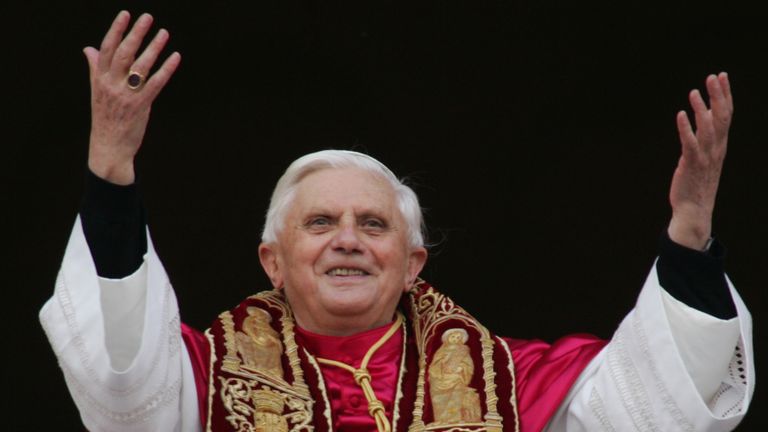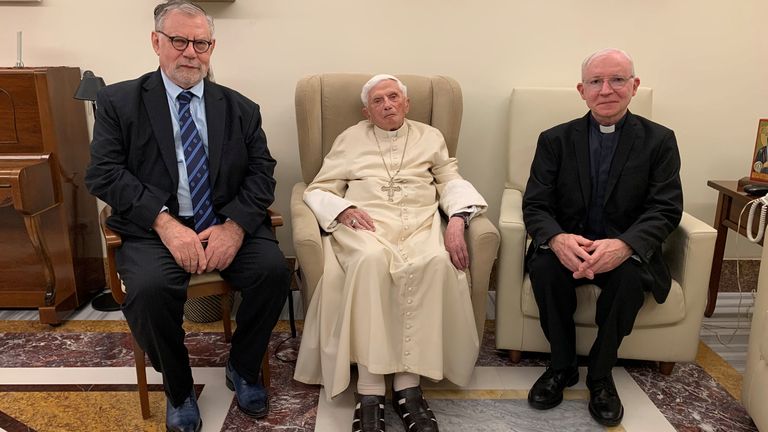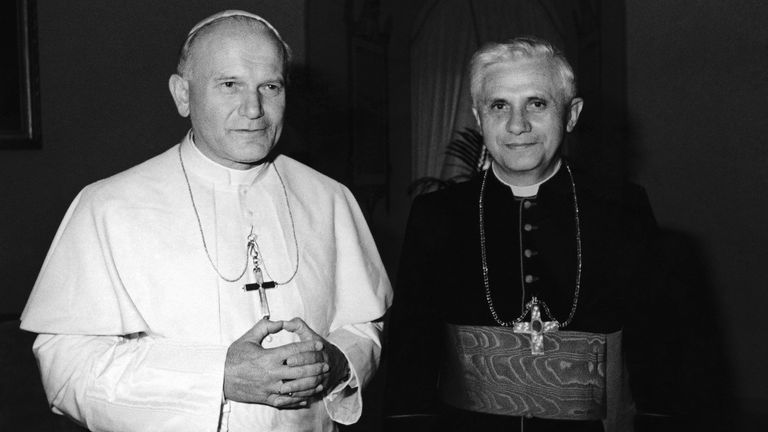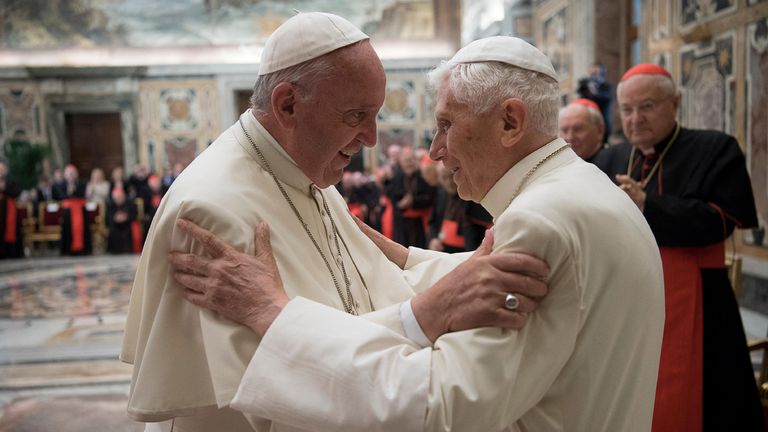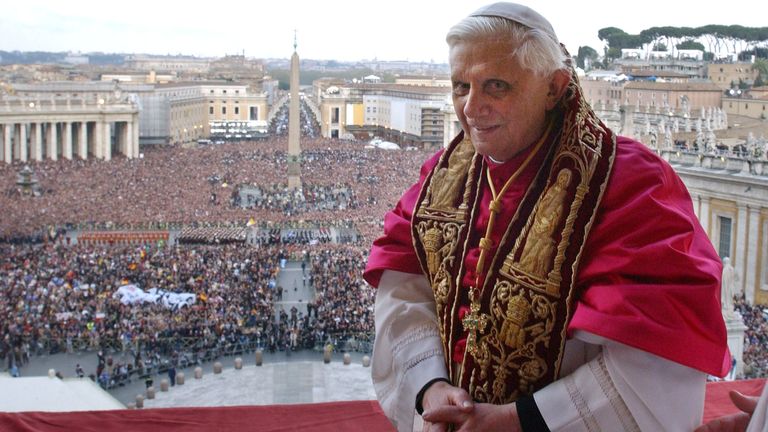Pope Benedict's rise to the top and the controversies surrounding his reign
Benedict had support from loyalists who believed he had been forced into retirement - but his pontificate will be remembered by others for the "great corruption and dysfunction" which surrounded it.
Saturday 31 December 2022 12:05, UK
Former Pope Benedict XVI upended centuries of tradition when he retired as head of the Roman Catholic Church.
The German's resignation on 28 February 2013 after nearly eight years as Pope saw him become the first to do so in 600 years.
He died aged 95 on Saturday.
Former pontiff dies after Pope Francis revealed he was 'very sick' - follow latest updates
Benedict succeeded Pope John Paul II, who had been head of the church since 1978, after his election in 2005.
But his deteriorating health had forced the then 85-year-old to "recognise my incapacity to adequately fulfil the ministry entrusted to me".
He continued to have support from some loyalists who believed he had been forced into retirement - but his pontificate will be remembered by others for the "great corruption and dysfunction" which surrounded it.
Born Joseph Aloisius Ratzinger in Bavaria, Germany, in 1927, he was the youngest and third child of a police officer father and a mother who would later manage his household when he was a cardinal.
He was aged five when he was part of a group of children to attend a visit by the Cardinal Archbishop of Munich - a moment which was said to have influenced his decision to become a cardinal himself when he grew older.
During the war, Ratzinger served in the Hitler Youth because membership was compulsory. He was never a member of the Nazi party and his family opposed Adolf Hitler's regime.
Ratzinger left Germany and his post as Archbishop of Munich in 1982 to head the Vatican's doctrinal office, the Congregation for the Doctrine of the Faith.
Amongst other duties the body deals with what the church considers to be the most serious crimes among its ranks, including clergy accused of sex abuse.
He held the powerful position for more than two decades before he became the first German pope in 1,000 years.
He was elected on 19 April 2005, with one cardinal calling him a "safe pair of hands" to succeed John Paul II.
Pope Benedict championed Christianity's European roots and showed his conservatism by repeatedly stressing family values and opposing abortion, euthanasia, and gay marriage.
Read more:
Resignation of 'God's Rottweiler' shocked the world - and he continued to be controversial
But his eight-year papacy was marked by controversy as Benedict became known for being a weak administrator who admitted a "lack of resolve in governing and decision taking".
He antagonised Muslims by appearing to suggest that Islam was inherently violent.
Benedict also angered Jews by rehabilitating a Holocaust denier and prompted international dismay by saying the use of condoms in the fight against AIDS only worsened the problem.
Then in 2012 the "Vatileaks" scandal rocked his papacy.
Paolo Gabriele, Benedict's butler, leaked secret documents that alleged corruption and feuding within the Vatican.
He is credited with reinvigorating the process of disciplining or defrocking predatory priests after a more lenient attitude under John Paul II - but child abuse scandals also cast a long shadow across much of his papacy.
Benedict ordered an inquiry into abuse in Ireland, which led to the resignations of several bishops.
He also disciplined the late Father Marcial Maciel, founder of the Catholic order, the Legionaries of Christ, and one of the church's most notorious predators.
The Vatican under Pope John Paul II had failed to act against Maciel despite the overwhelming evidence of his crimes.
But in 2022, an independent report in his native Germany alleged he had failed to take action in four cases of sexual abuse when he was Archbishop of Munich between 1977 and 1982.
In an emotional letter, the former pope acknowledged errors had occurred and asked for forgiveness, while his lawyers argued in a detailed rebuttal that he was not directly to blame.
'I am more of a professor'
From when he was a priest in 1963 until his resignation as pope in 2013, Benedict produced more than 60 books.
Boasting renowned strengths as a preacher, Benedict's books are predicted by some experts to continue to be influential for "decades to come".
Despite promising to keep a low profile after his retirement, Benedict continued to live in the Vatican while still writing and giving interviews.
"In reality I am more of a professor, a person who reflects and meditates on spiritual questions," Benedict said after his resignation.
He was galvanising for conservatives who opposed Pope Francis - some even failed to accept that he had resigned the papacy willingly and continued to consider him "my pope".
The "two popes" confusion was compounded because he chose to continue wearing white and be known as "pope emeritus".
The resulting polarisation led to calls from both conservatives and liberals for changes in church law to regulate the functions and status of former popes.
But despite the continuing loyalty, Benedict's pontificate will be remembered by others as dysfunctional.
Vatican expert Luke Coppen said: "Pope Benedict's number one strength was undoubtedly his intellect.
"His books were influential when they were released and will no doubt continue to be influential for decades to come.
"Pope Benedict was controversial throughout his pontificate for his strong defence of catholic teachings, especially those that are unpopular, in secular societies, such as abortion and AIDS and other issues.
"He was also criticised for his actions to do with the abuse crisis - he was under growing media pressure at various times in his pontificate over that.
"But his supporters said that he was in fact one of the strongest advocates of action against abuse."
Mr Coppen said many people believe Benedict's pontificate went "off course" due to the issues surrounding it.
He added: "Pope Benedict's pontificate was undoubtedly marked by great corruption and dysfunction within the Vatican itself and he struggled throughout his pontificate to deal with that.
"Many people think that in fact his pontificate went off course because of all the issues in the Vatican that prevented him from focusing on his key strengths of preaching and teaching."
